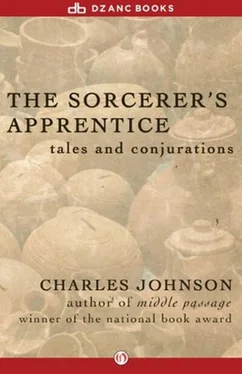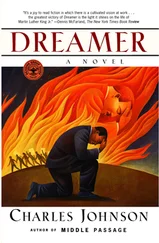But it seemed one night too early for closing time. His instincts on this had never been wrong before. He trotted back to the darkened storeroom; then his mouth snapped shut. His feeding bowl was as empty as he’d last left it.
“Say, Berkeley,” said Monkey, whose cage was near the storeroom. “What’s goin’ on? Tilford didn’t put out the food.”
Berkeley didn’t care a whole lot for Monkey, and usually he ignored him. He was downright wicked, a comedian always grabbing his groin to get a laugh, throwing feces, or fooling with the other animals, a clown who’d do anything to crack up the iguana, Frog, Parrot, and the Siamese, even if it meant aping Mr. Tilford, which he did well, though Berkeley found this parody frightening, like playing with fire, or literally biting the hand that fed you. But he, too, was puzzled by Tilford’s abrupt departure.
“I don’t know,” said Berkeley. “He’ll be back, I guess.”
Monkey, his head through his cage, held onto the bars like a movie inmate. “Wanna bet?”
“What’re you talking about?”
“Wake said Monkey. “Tilford’s sick. I seen better faces on dead guppies in the fishtank. You ever see a pulmonary embolus?” Monkey ballooned his cheeks, then started breathing hard enough to hyperventilate, rolled up both red-webbed eyes, then crashed back into his cage, howling.
Not thinking this funny at all, Berkeley padded over to the front door, gave Monkey a grim look, then curled up against the bottom rail, waiting for Tilford’s car to appear. Cars of many kinds, and cars of different sizes, came and went, but that Saturday night the owner did not show. Nor the next morning, or the following night, and on the second day it was not only Monkey but every beast, bird, and fowl in the Shoppe that shook its cage or tank and howled at Berkeley for an explanation — an ear-shattering babble of tongues, squawks, trills, howls, mewling, bellows, hoots, blorting, and belly growls because Tilford had collected everything from baby alligators to zebra-striped fish, an entire federation of cultures, with each animal having its own distinct, inviolable nature (so they said), the rows and rows of counters screaming with a plurality of so many backgrounds, needs, and viewpoints that Berkeley, his head splitting, could hardly hear his own voice above the din.
“Be patient!” he said. “Believe me, he’s com-in’back!”
“Come off it,” said one of three snakes. “Monkey says Tilford’s dead . Question is, what’re we gonna do about it?”
Berkeley looked, witheringly, toward the front door. His empty stomach gurgled like a sewer. It took a tremendous effort to untangle his thoughts. “If we can just hold on a—”
“We’re hungry !” shouted Frog. “We’ll starve before old Tilford comes back!”
Throughout this turmoil, the shouting, beating of wings, which blew feathers everywhere like confetti, and an angry slapping of fins that splashed water to the floor, Monkey simply sat quietly, taking it all in, stroking his chin as a scholar might. He waited for a space in the shouting, then pushed his head through the cage again. His voice was calm, studied, like an old-time barrister before the bar. “Berkeley? Don’t get mad now, but I think it’s obvious that there’s only one solution.”
“What?”
“Let us out,” said Monkey. “Open the cages.”
“No!”
“We’ve got a crisis situation here.” Monkey sighed like one of the elderly, tired lizards, as if his solution bothered even him. “It calls for courage, radical decisions. You’re in charge until Tilford gets back. That means you gotta feed us, but you can’t do that, can you? Only one here with hands is me . See, we all have different talents, unique gifts. If you let us out, we can pool our resources. I can open the feed bags!”
“You can?” The watchdog swallowed.
“Uh-huh.” He wiggled his fingers dexterously, then the digits on his feet. “But somebody’s gotta throw the switch on this cage. I can’t reach it. Dog, I’m asking you to be democratic! Keeping us locked up is fascist!”
The animals clamored for release; they took up Monkey’s cry, “Self-determination!” But everything within Berkeley resisted this idea, the possibility of chaos it promised, so many different, quarrelsome creatures uncaged, set loose in a low-ceilinged Shoppe where even he had trouble finding room to turn around between the counters, pens, displays of paraphernalia, and heavy, bubbling fishtanks. The chances for mischief were incalculable, no question of that, but slow starvation was certain if he didn’t let them in the storeroom. Furthermore, he didn’t want to be called a fascist. It didn’t seem fair, Monkey saying that, making him look bad in front of the others. It was the one charge you couldn’t defend yourself against. Against his better judgment, the watchdog rose on his hindlegs and, praying this was the right thing, forced open the cage with his teeth. For a moment Monkey did not move. He drew breath loudly and stared at the open door. Cautiously, he stepped out, stood up to his full height, rubbed his bony hands together, then did a little dance and began throwing open the other cages one by one.
Berkeley cringed. “The tarantula, too?”
Monkey gave him a cold glance over one shoulder. “You should get to know him, Berkeley. Don’t be a bigot.”
Berkeley shrank back as Tarantula, an item ordered by a Hell’s Angel who never claimed him, shambled out — not so much an insect, it seemed to Berkeley, as Pestilence on legs. (“Be fair!” he scolded himself. “He’s okay, I’m okay, we’re all okay.”) He watched helplessly as Monkey smashed the ant farm, freed the birds, and then the entire troupe, united by the spirit of a bright, common future, slithered, hopped, crawled, bounded, flew, and clawed its way into the storeroom to feed. All except crankled, old Tortoise, whom Monkey hadn’t freed, who, in fact, didn’t want to be released and snapped at Monkey’s fingers when he tried to open his cage. No one questioned it. Tortoise had escaped the year before, remaining at large for a week, and then he returned mysteriously on his own, his eyes strangely unfocused, as if he’d seen the end of the world, or a vision of the world to come. He hadn’t spoken in a year. Hunched inside his shell, hardly eating at all, Tortoise lived in the Shoppe, but you could hardly say he was part of it, and even the watchdog was a little leery of him. Berkeley, for his part, had lost his hunger. He dragged himself, wearily, to the front door, barked frantically when a woman walked by, hoping she would stop, but after seeing the window sign, which read-CLOSED-from his side, she stepped briskly on. His tail between his legs, he went slowly back to the storeroom, hoping for the best, but what he found there was no sight for a peace-loving watchdog.
True to his word, Monkey had broken open the feed bags and boxes of food, but the animals, who had always been kept apart by Tilford, discovered as they crowded into the tiny storeroom and fell to eating that sitting down to table with creatures so different in their gastronomic inclinations took the edge off their appetites. The birds found the eating habits of the reptiles, who thought eggs were a delicacy, disgusting and drew away in horror; the reptiles, who were proud of being coldblooded, and had an elaborate theory of beauty based on the aesthetics of scales, thought the body heat of the mammals cloying and nauseating, and refused to feed beside them, and this was fine for the mammals, who, led by Monkey, distrusted anyone odd enough to be born in an egg, and dismissed them as lowlifes on the evolutionary scale; they were shoveling down everything — bird food, dog biscuits, and even the thin wafers reserved for the fish.
Читать дальше












